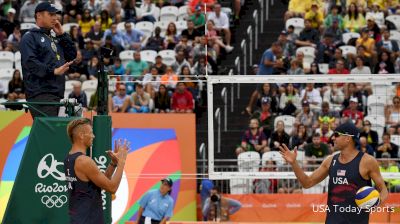Controversial Challenge in Jake Gibb and Casey Patterson's Final Pool Match

In the third set of Jake Gibb and Casey Patterson’s final pool play match versus Pablo Herrera and Adrian Gavira of Spain, there was a controversial challenge called.
The score was 5-2, with Spain leading, and this is how the play went down. Gavira got up to take a swing on the ball and it looked like he and Gibb jousted at the net. The ball came down on the Americans’ side, Gibb played it up, Patterson set him, and Gibb scored with a shot over the net.
Spain immediately called for a challenge. The Americans thought the Spaniards were challenging four hits, which is not one of the plays that can be challenged under FIVB rules.
Here are the five instances in which you can call a challenge:
- Ball in/out
- Block touch
- Net fault
- Antenna touch
- Foot fault at service
In fact, Spain must have been challenging block touch. They were saying Gibb’s first touch was not simultaneous with Gavira’s, therefore it should be counted as the Americans’ first contact, and not a joust.
That is an acceptable challenge, because of this specific language, embedded in the rules under the block touch instance:
Block touch - contact with the ball by the player
i. With the ball landing after the block action;
ii. with the ball remaining in play (i.e.: block contact followed by 3 hits; or no block contact followed by a double hit by the same player)
Spain must have asked for a review of whether or not Gibb’s first contact was a joust or a block, and since they awarded Spain the point, making the score 6-2, they must have determined that the contact was not in fact simultaneous, making Gibb’s contact a block and not a joust.
The Americans were also complaining that if Spain was challenging the touch on the block they would have had to call challenge earlier in the point, since the rules say “the challenge may be requested by either player immediately after the occurrence of the suspected fault and will prompt the 1st referee to stop the action when the suspected fault occurs during play. Otherwise, teams have five seconds after the rally is over to challenge exclusively the decisive action that finishes the rally.” BUT, since the block touch didn’t come into play until Patterson set Gibb and Gibb took that final touch on the ball, they could challenge the block touch after the rally had ended.
Gibb and Patterson lost that match 21-19, 16-21, 15-7, and with Austrians Robin Seidl and Alexander Huber losing their final pool play match to Qatar’s Jefferson and Cherif, the Americans finished fourth in their pool and have been devastatingly prevented from advancing to the elimination round of the Olympics.